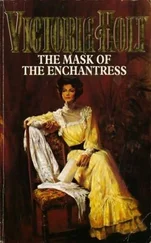I saw his point. Henry was wavering, but my fate did not rest on Henry's own subjects but those two powerful states of Europe—by necessity enemies of each other, and who were grappling for power. It was so important for France to accept me as Queen; and if the Emperor did also, I might be safe.
“The attitude has changed now that Katharine is dead,” said George. “He could condemn your marriage only while she lived. Now it seems he is letting his political needs override his family feeling. He needs Henry as an ally against François.”
“François has been a good friend to us for most of the time while the divorce was pending.”
“He has shown himself to be completely unreliable. The Emperor would be more stable. Moreover, he is a great general. He is the wisest ruler in Europe and he would be a better ally.”
“Then there is a glimmer of hope?”
George nodded. “I cannot believe that the King wants to go through all the trouble of divorce again.”
“He will have to, if he wants to marry Jane Seymour.”
“He must tire of her soon. If only the silly little thing would sleep with him, it would be over in a matter of weeks.”
“She's set on a crown.”
“You mean her brothers are for her. She is of a nature to be pushed this way and that.”
“So different from me. I think he looks for change.”
“It may be. But we have to stop it, Anne. And if the Emperor shows he is ready to accept you, it might well be that the King would forget Jane Seymour.”
“What of the Pope? What of the break with Rome? The Emperor will never accept that.”
“Emperors and Kings accept whatever is expedient. I think the Emperor wants an alliance with England. Religion is used by rulers. That is why there is often conflict between Church and State.”
And so we hoped.
My spirits rose—as they could so easily. We prepared entertainments for the emissaries. I even became friendly with Chapuys. I think, as usual, I reacted too vehemently, and I have no doubt now that my actions were regarded with cynicism by that wily spy.
Then our spirits drooped, for when Charles's mission arrived, Henry made it clear that I was not to be included in the discussions. Moreover, they failed. Presumably Henry would not accept Charles's terms.
Gloom returned and I felt as though I were waiting for a terrible disaster to overtake me.
George was disturbed. “But,” he said, “there is one fact that must make us rejoice. Cromwell is the most powerful man in England. He is another Wolsey, which is understandable since he was taught by the great man. It is Cromwell who will decide foreign policy; and Cromwell brought about the divorce and the break with Rome. He must support you. He cannot give way. If he does the foundations on which he has built his fortunes will collapse.”
That was a comforting thought. Our hopes were based on Cromwell.
Cromwell was indeed a clever man. He was very busy with the monasteries. A new act had been brought in to dissolve all those which had not a revenue of £200 a year, and to grant their possessions to the King. Cromwell, under the King's orders, was selling them to the gentry, which, according to Cromwell, was a way of involving them in the operation. Those who had come by reasonably priced land and building would regard the Dissolution of the Monasteries as a very worthy act.
Wolsey had fallen through the King's desire to be rid of Katharine and marry me. Cromwell could fall through my removal in favor of Jane Seymour.
I remembered how incensed Henry had been with Wolsey because he could not procure the divorce from Katharine. Would he be equally angry with Cromwell because he could not devise a plan to be rid of me?
I could imagine Henry's irritation. He had always had an affection for Wolsey and never had for Cromwell. I was sure Cromwell had to face some humiliating moments with his master at this time.
But I saw the man as my savior. He could not desert me. My fate was too closely entwined with his.
How determined was the King to marry Jane Seymour? That was the vital question. I, who understood him well, guessed that it was not that he desired Jane intensely. There were far more attractive women at Court with whom he could have found satisfaction and who would have been only too ready to please him. It was the basic desire for a son which I had failed to give him. It was his determination, his lust for power rather than for the female body. When he became set on a purpose, it must be carried through, for if it were not, it was a denial of his strength.
That was what alarmed me. But I thought: While Cromwell is in charge, I am safe.
How wrong I was, I was to learn later.
Henry was badgering Cromwell. He must bring out some plan for ridding him of me, that he might marry Jane Seymour. They had already tried a pre-contract with Northumberland. When they had brought it up before, Henry had been determined to quash it, for then he had been desperately anxious to marry me. Could it be brought up again? Possibly. But they would need something stronger than that. I guessed Henry wished it had not been brought forward before. It would have been easier to have made it important now if it had not already been examined and dismissed.
Cromwell had to find a way.
Having been on several diplomatic missions during his life, George was well aware of what was going on politically and the manner in which diplomats worked. He now understood that Cromwell wanted an alliance with the Emperor.
George heard that the emissaries had left and that Henry had rejected their terms. Cromwell had had a heated discussion with the King. The King was against an alliance with the Emperor. The man was Katharine's nephew and he had been responsible for much of the anguish which Henry had suffered during those waiting years. Cromwell wanted to put aside all good allies. The Emperor wanted the alliance; he was a strong man. We should understand each other better than we ever could the French.
Henry hated to be contradicted; he stormed at Cromwell. Cromwell did nothing for him. He had saddled him with the Queen and he could find no release for him. He wanted a son. He had to have a son. And so on…
Cromwell staged a coughing fit and called for wine. He said he had a fever. The King dismissed him and he retired to Stepney.
There he remained in bed for a whole week. Whether he really had a fever or was weighing up the position, we did not know. George thought the latter, for when he emerged he had clearly made up his mind.
I was soon to learn with what disastrous effect on me, for Cromwell was no longer my friend. He had become my bitterest enemy—purely as a matter of necessity, for Cromwell's actions were not dictated by personal feelings.
He had learned that he could not keep the King's favor while I was Queen of England; he could not bring about the treaty of friendship with the Emperor, for, as I learned later, Charles had made it clear that he would not treat with Henry while I was accepted as his wife.
Cromwell would do anything—however ruthless—to save his own skin and keep that power which he was building up for himself.
The year was advancing. It would soon be May—a lovely month, with the flowers bursting forth—buttercups and dandelions in the fields, ladysmocks and cuckoo flowers on the river banks. One's spirits must rise with the May sunshine.
The first hint of alarm had come when May was almost on us and I noticed that Mark Smeaton was missing. I asked one of the women where he was. She replied that she did not know. She had seen him the previous day and he had seemed rather excited.
“Some secret,” I said. “Do you think he has a mistress?”
“Mark has no eyes for any but you, Madam,” was the reply.
Читать дальше







